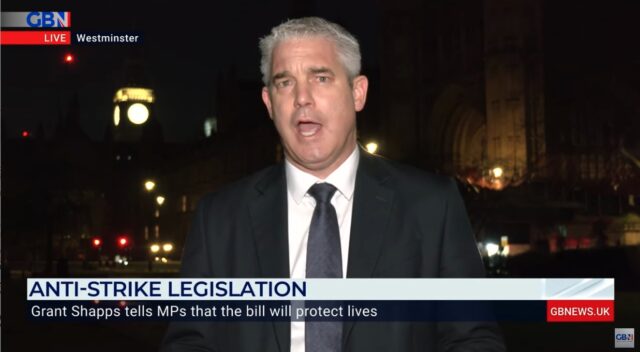HEALTH Secretary Steve Barclay has insisted that he is working with trade unions to bring an end to strikes in the NHS.
He told GB News: “We’re working closely with trade union partners in terms of the contingency plans that we’re putting in place but clearly there will be an impact today on patient responses and that is very concerning.
“There’s only so much that can be done through those contingency measures. We’ve provided in full this settlement that the independent Pay Review Body has awarded that came on top of 3% last year, which was at a time when the rest of the public sector was facing a pay freeze.
“We’ve been having further discussions with the trade unions, but clearly it is disruptive to patients to have these strikes and we’re saying to people, if they do face genuine life threatening issues, then of course, the response is to phone 999. But if not, then to be very mindful of the pressure on the system today.
“We were just asking people to be mindful of this significant pressure our ambulance service will be under today.”
He added: “We’re keen to work with the trade unions in terms of our evidence to the Pay Review Body, that’s why we had constructive discussions with them on Monday, I’m meeting the doctors union to discuss further today.
“It’s important in terms of this coming year’s Pay Review Body that we get that right, that we work constructively together on the evidence that goes in and of course that will take on board what has happened over the last year.”
Asked by Eamonn Holmes about long ambulance waiting times, Mr Barclay said: “Here we recognise that the pressure that we’ve seen particularly in emergency departments in accident and emergency hasn’t been acceptable and I made that clear in the House of Commons on Monday that’s in common with many other countries as well.
“If you look at what the First Minister said in Scotland, their hospitals are nearly completely full. If you look at Wales there’s severe pressure on the NHS and more than 50,000 patients are waiting more than two years for their operations.
“If you look in France in Germany, they have intensive care units as saturated, my counterpart the French minister was saying, because there’s been massive pressure on the system as a consequence of the pandemic.”
“We’ve got more than 9000 patients still in hospital with Covid and then we had this massive surge going into Christmas with seven times as many people with flu compared to the previous month and 100 times more patients in hospital with flu compared to this time last year.”
On the union talks, he said: “We were discussing with the unions how we make any settlements more affordable, particularly focusing on the coming years’ Pay Review body but of course I listened to the representations from the trade unions in terms of the cost of living pressures that they face.
“The independent Pay Review Body looks at what is affordable across the board. What we’re keen to explore and have been exploring is where there are opportunities to go further through productivity through efficiency, looking for example, at the significant agency costs.”
He added: “There’s been massive pressure on the system. That’s why I announced on Monday a further £250 million pounds to provide very quick support to get more people out of hospital into residential care, those people who are fit to be discharged from hospital around 13,000 patients who don’t need to be in hospital and can be discharged.
“That of course builds on the funding that we were already allocating at the autumn statement…
“But what we saw in common with countries, whether in Scotland, Wales, but across Europe, was a massive surge in flu cases that has put enormous pressure on the NHS and that’s what I set out with a range of measures on Monday.”




